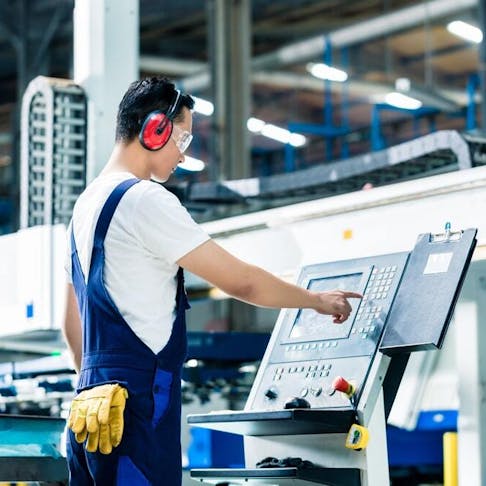
CNC Machinist: Job Roles and Descriptions
Learn all about this critical role in manufacturing and the skills needed to perform in this job.

What is a CNC Machinist? A CNC machinist uses computer software programs to create operating instructions for computer numerical controlled precision machinery such as presses, drills, and lathes. They are also called CNC operators or CNC machine operators.
What Is a CNC Machinist?
A CNC machinist uses blueprints, sketches, or computer-aided design (CAD) and manufacturing files to produce precision parts. They set up different types of CNC equipment for their work to accomplish goals with accuracy while also maintaining high production rates. They typically work for job shops that tend to be smaller manufacturers but may also work for mid-size or larger firms that have a broad selection of equipment that is used for fabricating parts or products.
Some CNC machinists specialize in a specific type of machinery, such as milling machines, while others work with a wider range of machines. Depending on the industry, CNC machinists may be responsible for different day-to-day tasks. They typically make sure their CNC machines are set up correctly, functioning properly, and producing parts that meet the required specifications.
What Are the Roles of a CNC machinist?
The role of a CNC machinist is to operate and maintain CNC machines. They review sample parts against drawings or CAD models to ensure accurate production and take precise measurements for cutting/shaping tasks using appropriate machine settings. A CNC machinist’s responsibilities include reviewing samples, drawings, or instructions to understand the specifications for the machine output, taking measurements and marking material for cutting or shaping, and planning the sequence of necessary actions for completing a job. Their other roles include selecting appropriate machines and their positions needed for a given job, loading material for that job, determining and programming the size of batches and the machine speed needed, and monitoring machines while they are in operation to adjust the feed, maintain proper temperature, and identify any issues that may need correction.
Other CNC machinist responsibilities include checking the machine output to ensure consistency with specifications, discarding defects, keeping records of approved final products, and performing routine machine maintenance or performing corrective maintenance actions.
What Skills Do CNC Machinists Require?
A CNC machinist is required to be proficient in all aspects of CNC machining, including milling, turning, close tolerance manufacturing, and more. Proficiency in CAD software is essential. They should have the ability to use precision tools for Quality Control and Metrology (such as calipers), be able to take accurate measurements, have knowledge of the properties of metal and other materials, and possess the ability to read blueprints, schematics, and manuals.
CNC machinists also require physical stamina and strength to lift heavy items and be possessive of good math skills.
What Are the Necessary Personality Traits for CNC Machinists?
CNC machinists should love working with computers. They should enjoy the challenge of troubleshooting when things go wrong. CNC machinists should be detail-oriented since they are usually producing parts with tight tolerances where even fractions of a millimeter count. They should have a passion for creating things and be effective at time management.
CNC machinists should also possess good problem-solving skills and the ability to adapt quickly to changing conditions. CNC machining is, by far, an automated process, but automation is not a guarantee of problem-free production. There will always be things that need to be adjusted or unforeseen issues that will arise. CNC Machinists should also be team players since they will work closely with design engineers, plant managers, and Quality Control specialists.
How To Become a CNC Machinist
The requirements for becoming a CNC machinist vary depending on the employer. However, in most cases, a high school diploma or GED is required to become a CNC machinist.
In addition, machinists will need to complete some formal training, whether on the job or through a specialized trade school training program.
CNC operator positions are often taken by those just starting out in the industry. The length of time to become an operator depends on the employer and how much experience they require. Some complete on-the-job training after high school, while others start in operator positions after completing a CNC machining training program.
How Much Can a CNC Machinist Earn?
The average salary for a CNC machinist is $47,850 in the United States. The national average high is $55,050, and the national average low is $40,700.
What Factors Influence a CNC Machinist’s Salary?
Experience, location, education, company size, market, and industry are all factors that influence a CNC machinist’s salary.
Where Do CNC Machinists Receive the Highest Pay?
Machinists in New York have the highest average salary at $77,050.
Where Can a CNC Machinist Work?
CNC machinists can work in machine shops or manufacturing facilities. They work in industries that include motor vehicle manufacturing, mechanical engineering product development, aerospace product manufacturing, parts/components manufacturing, and metalworking machinery manufacturing. Producers of custom parts or products have a need for CNC Machinists as the nature of that business involves frequent changes to production runs for customers that have different requirements.
Are Math Skills Required To Be a Good CNC Machinist?
Yes, math skills are required to be a good CNC machinist. Because reading blueprints is a big part of a CNC machinist’s job, good math skills are necessary to understand their work. In addition, using measurement and metrology tools requires mathematical skills to assure that the parts being machined are accurate to the drawing or CAD model design.
Does Xometry Help With a CNC Machinist's Job Tasks?
Yes, Xometry helps with a CNC machinist’s job tasks. Xometry is the industry leader in custom, quick-turn CNC machining services for rapid prototyping and production parts. Our massive partner network means that whatever your part, we have a shop and a machine that can make it. We integrate seamlessly with over 3,000 vetted manufacturing partners in the U.S., including ITAR-qualified facilities, and we are ISO 9001:2015 and AS9100D certified.
What Is the Difference Between a CNC Machinist and a CNC Operator?
In some organizations, there is not much of a difference between the role of a CNC Machinist and a CNC Operator, and the terms are sometimes used interchangeably. However, it is generally accepted that a CNC operator is usually more of an entry-level position in a company. CNC operators stock materials and run parts. They confirm specific directions that are followed to create an end product that meets the required specifications. CNC operators set up and operate CNC machines and equipment. An operator may unload raw materials, prepare a test run to ensure a machine is working properly, and inspect and measure finished products to ensure they meet requirements. Essentially, the difference between a CNC machinist and a CNC operator is that the operator does prep work and post-work, while the machinist does the actual machining.
The role of a CNC machinist is more advanced than that of an operator. Machinists can accurately machine parts to print using a variety of machines and methods. They rely on their skills and expertise, often obtained through an accredited trade school or many years of on-the-job experience.
Many machinists start as operators and work their way up into this role. This is because the CNC industry is very complex, and machinists need to grasp basic machine operations before taking on more responsibility.
Is a Bachelor’s Degree Required To Be a CNC Machinist?
A bachelor’s degree is typically not required to be a CNC machinist. Most machine shops require a high school diploma or GED, plus some amount of specialized training to be a CNC machinist.
Is a License Required To Be a CNC Machinist?
State licensing or Industry Certification is not necessarily required to be a CNC machinist, but it may be available and useful to strengthen an applicant’s chances of getting a job. In addition, many individual workplaces may require CNC machinists to be licensed on their machines in order to ensure a safe workplace.
Summary
This article reviewed the role of a CNC Machinist and described the education, skills, and traits needed to succeed in this position.
Xometry provides a wide range of manufacturing capabilities, including CNC Machining and other value-added services for all of your prototyping and production needs. Visit our website to learn more or to request a free, no-obligation quote.
Disclaimer
The content appearing on this webpage is for informational purposes only. Xometry makes no representation or warranty of any kind, be it expressed or implied, as to the accuracy, completeness, or validity of the information. Any performance parameters, geometric tolerances, specific design features, quality and types of materials, or processes should not be inferred to represent what will be delivered by third-party suppliers or manufacturers through Xometry’s network. Buyers seeking quotes for parts are responsible for defining the specific requirements for those parts. Please refer to our terms and conditions for more information.
